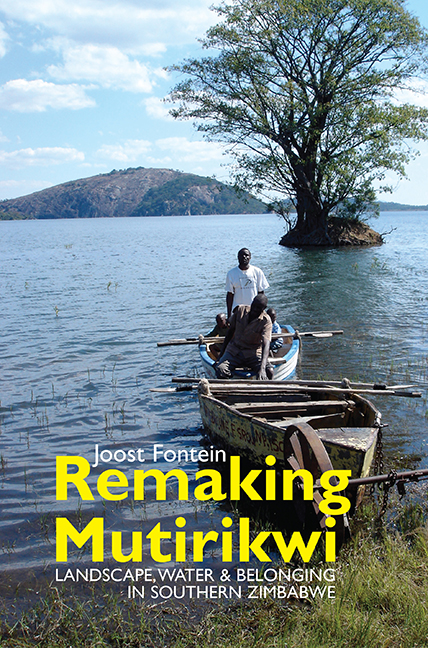Book contents
- Frontmatter
- Dedication
- Contents
- Illustrations
- Acknowledgements
- Note on Fieldwork, Notes & Sources
- Glossary
- Acronyms & Abbreviations
- Chronology
- Remaking Mutirikwi: An Introduction
- Part One Remaking Mutirikwi in the 2000s
- Part Two Damming Mutirikwi 1940s–1990s
- Epilogue: Remaking Mutirikwi in the late 2000s & early 2010s
- Bibliography
- Index
- Eastern African Studies
2 - Graves, Ruins & Belonging
Published online by Cambridge University Press: 11 June 2021
- Frontmatter
- Dedication
- Contents
- Illustrations
- Acknowledgements
- Note on Fieldwork, Notes & Sources
- Glossary
- Acronyms & Abbreviations
- Chronology
- Remaking Mutirikwi: An Introduction
- Part One Remaking Mutirikwi in the 2000s
- Part Two Damming Mutirikwi 1940s–1990s
- Epilogue: Remaking Mutirikwi in the late 2000s & early 2010s
- Bibliography
- Index
- Eastern African Studies
Summary
This chapter has three purposes. First, I discuss contestations over autochthony and belonging taking place in the context of fast-track land reform around Mutirikwi in the 2000s, in order to contribute to a growing body of work exploring how land reform is part of an ongoing remaking of the (postcolonial) state. Second, I consider this micro-politics of belonging in relation to recent, diverse (but often complementary) approaches to ‘materiality’, which have sought to decentre the agency of human subjects by exploring the agency, affordances and affective qualities of things, materials and landscapes (Miller 2005; Gell 1998; Latour 1999; Ingold 1992 & 2007; Navaro-Yashin 2009; Stoler 2008; Edensor 2005). Finally, I link these discussions to anthropology's recent, ‘ontological turn’, which has seen a renewed and ‘deepened’ concern with ‘radical difference’ (Henare et al. 2006; Carrithers et al. 2008), to make a case for focusing on discursive, historical and material co-existences and proximities. How do the material forms of different past and present practices in the landscape reveal and materialise proximities and co-existences even as they are often articulated in political processes of differentiation? What is the significance for anthropology of such material and historical proximities and co-existences in shared landscapes? I suggest that, in social and historical contexts where difference is increasingly politicised as the contours of political inclusion and exclusion are dramatically redrawn, such as in post-2000 Zimbabwe, sensitivity to peoples’ material engagements with space and substance can offer a way of writing against such politicised differences rather than re-asserting them on ever more abstract philosophical grounds.
THE BOROMA HILLS
I begin by discussing two apparently unrelated phenomena that have taken place around the Boroma hills, in order to introduce how the remains of different pasts are ‘active’ in ongoing, entangled discourses and practices of belonging and autochthony. These hills lie to the south of Lake Mutirikwi, on the boundary of what were once the farms of Oatlands, Le Rhone, Clifton and The Retreat, and are now at the centre of localised contests over authority and belonging between the two neighbouring Duma chiefs, Murinye and Mugabe and their clans, and between the inhabitants of several resettlement schemes established soon after independence when these farms became state land. These schemes’ grazing areas, as well as swathes of other land bordering the lake, were occupied by so-called ‘squatters’ during the land invasions of the early 2000s.
- Type
- Chapter
- Information
- Remaking MutirikwiLandscape, Water & Belonging in Southern Zimbabwe, pp. 52 - 77Publisher: Boydell & BrewerPrint publication year: 2015

